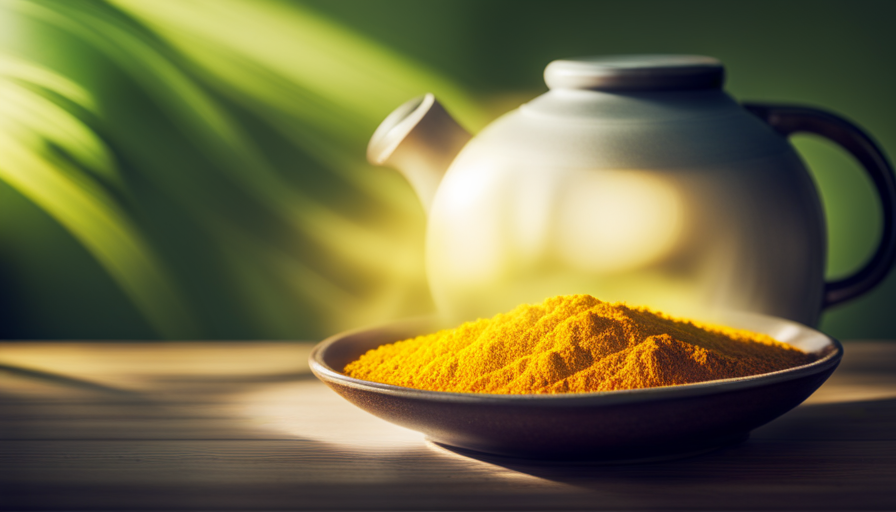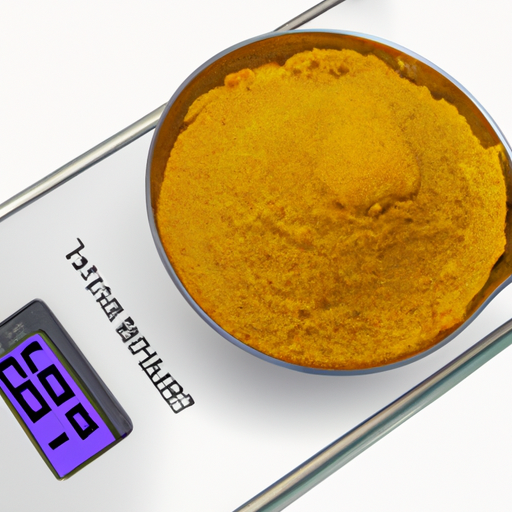I’ve always been captivated by the possible health advantages of using natural treatments. Turmeric tea is one remedy that has recently seen a surge in popularity. This age-old spice, which has been utilized for hundreds of years in both Ayurvedic healing practices and culinary practices, is now becoming a favored component in teas and various drinks.
Turmeric contains compounds called curcuminoids, which are believed to have anti-inflammatory and antioxidant properties. These compounds may help to reduce inflammation throughout the body, which is thought to be a contributing factor in many chronic diseases.
In this article, we will explore the benefits of turmeric tea, how to make it, possible side effects, dosage recommendations, and other ways to incorporate this spice into your diet.
Join me as we discover what turmeric tea can do for our bodies!
Key Takeaways
- Turmeric tea contains curcuminoids with anti-inflammatory and antioxidant properties, which can reduce inflammation throughout the body.
- It may improve brain function, prevent cancer, promote healthy digestion, and help with irritable bowel syndrome.
- Turmeric tea can be made with water, turmeric powder or fresh grated turmeric root, and honey or lemon to taste. The recommended dosage is 1-2 grams per day.
- While generally safe to consume in moderation, turmeric tea can cause upset stomach and dizziness in some individuals. Pregnant and nursing women should exercise caution, and it can interfere with certain medications, so consulting with a doctor before incorporating it into your diet is recommended.
The Origins of Turmeric
You’re probably not aware, but the golden spice in your turmeric tea has been around for thousands of years and has significant cultural significance. Turmeric is a plant that grows mostly in India and Southeast Asia, where it’s been used for traditional medicinal purposes for as long as anyone can remember.
In fact, turmeric is so deeply ingrained in Indian culture that it’s even present in some religious ceremonies. It’s commonly referred to as ‘haldi’ and is used by both Hindus and Muslims alike during weddings to signify purity, fertility, and good luck.
Beyond these symbolic uses, turmeric has also been traditionally used to treat a variety of ailments ranging from inflammation to digestive issues. So why exactly has turmeric been so highly regarded throughout history?
Well, modern science has shown that turmeric contains compounds called curcuminoids which have potent anti-inflammatory effects on the body. This is likely why it was traditionally used to treat inflammatory conditions such as arthritis or skin rashes. But beyond its anti-inflammatory properties, curcuminoids may also have benefits for brain health and cancer prevention.
With this rich history behind it, it’s no wonder that turmeric remains a popular ingredient today. In the next section, we’ll explore some of the specific benefits you can expect from drinking turmeric tea regularly – from reducing joint pain to improving your mood!
The Benefits of Turmeric Tea
Experience the incredible advantages of incorporating this golden elixir into your daily routine. Turmeric tea has been used for centuries in traditional Ayurvedic medicine as a natural remedy. It can reduce inflammation, boost immunity, and promote healthy digestion. The active ingredient in turmeric, curcumin, has potent anti-inflammatory properties. It can help alleviate chronic pain caused by conditions such as arthritis and even reduce the risk of heart disease.
The immune system is a complex network of cells and proteins that defend the body against infections and diseases. Turmeric tea contains powerful antioxidants that can help strengthen the immune system by neutralizing harmful free radicals. Additionally, research suggests that curcumin may improve brain function. It does this by increasing levels of a hormone called brain-derived neurotrophic factor (BDNF). BDNF is responsible for promoting the growth of new neurons in the brain.
Healthy digestion is essential for overall well-being, but many people struggle with digestive issues such as bloating, gas, and indigestion. Drinking turmeric tea regularly may help improve digestion by stimulating bile production and reducing inflammation in the gut lining. Furthermore, studies have shown that curcumin may be beneficial for individuals with irritable bowel syndrome (IBS). This is due to its ability to modulate gut microbiota.
Incorporating turmeric tea into your daily routine can provide numerous health benefits. It can improve brain function, promote healthy digestion, and strengthen the immune system. Learn how easy it is to make this delicious beverage at home using simple ingredients from your pantry in the next section.
How to Make Turmeric Tea
Get ready to spice up your daily routine with a cup of homemade turmeric tea – it’s as easy as pie! Not only is this tea delicious and flavorful, but it also has numerous health benefits.
Turmeric contains curcumin, which has anti-inflammatory properties that can help reduce joint pain and inflammation. It also supports brain function and aids in digestion.
To make turmeric tea, you’ll need just a few simple ingredients: water, turmeric powder or fresh grated turmeric root, honey or lemon to taste. Boil water in a pot and add the turmeric powder or grated turmeric root. Let it simmer for about 10 minutes before straining out any remaining pieces of ginger. Add honey or lemon to taste.
Incorporating this healthy beverage into your daily routine is easy. Drink a cup of turmeric tea in the morning to help wake up your digestive system and start your day off right. You can also enjoy it in the afternoon or evening to unwind after a long day at work or before bed for its calming properties.
With all these amazing benefits, there’s no reason not to give this tasty drink a try!
Best Time to Drink Turmeric Tea
Now is the perfect time to enjoy a cup of turmeric tea, as it can help you feel refreshed and rejuvenated throughout the day. But when exactly is the best time to drink this golden elixir? Is it in the morning or evening? While there’s no hard and fast rule, it depends on your goal.
If you’re looking to reap the health benefits of turmeric, such as reducing inflammation and improving brain function, then drinking turmeric tea in the morning may be more effective. Studies have shown that consuming turmeric in the morning allows for better absorption by the body. Additionally, starting your day with a warm cup of tea can help kick-start your metabolism and provide a natural energy boost.
On the other hand, if weight loss is your primary objective, sipping on turmeric tea in the evening might be more beneficial. Turmeric has been shown to aid in weight loss by reducing insulin resistance and promoting fat burning. Drinking it before bedtime can also promote better sleep quality, which can indirectly support weight loss efforts.
As with any new addition to your diet or routine, it’s important to listen to your body and adjust accordingly. Whether you choose to drink turmeric tea in the morning or evening, remember that consistency is key for lasting results.
Possible side effects of consuming too much turmeric include upset stomach and dizziness. However, when consumed in moderation and as part of a balanced diet, turmeric tea can provide numerous health benefits without any adverse effects.
Possible Side Effects
If you consume too much turmeric, you might feel a bit dizzy or have an upset stomach. While turmeric tea is generally safe to consume in moderation, it’s important to note that consuming large amounts of this spice can lead to digestive discomfort and allergic reactions.
To help you better understand the possible side effects of turmeric tea, here are some things to keep in mind:
- Turmeric can cause gastrointestinal issues such as bloating, gas, and diarrhea when consumed in high doses.
- Some individuals may be allergic to turmeric and experience symptoms such as hives, itching, or difficulty breathing.
- Turmeric can also interact with certain medications such as blood thinners or diabetes medications.
Despite these potential side effects, it’s important to note that many people tolerate turmeric tea well and enjoy its many health benefits. To ensure safe consumption of this spice, it’s recommended that individuals consult with their healthcare provider before adding it to their diet.
Now that we’ve discussed some possible side effects of turmeric tea consumption, let’s take a closer look at appropriate dosage levels for optimal health benefits.
Dosage
To maximize the health benefits of turmeric, you’ll want to find the appropriate dosage that works for you. The recommended dosage of turmeric tea is about 1-2 grams per day, which is equivalent to approximately ½ teaspoon to 1 teaspoon of ground turmeric root powder. However, it’s important to note that everyone’s body reacts differently to certain substances, so it’s best to consult with a healthcare provider before adding any new supplement into your diet.
Here’s a helpful table that breaks down the recommended daily intake of turmeric based on different forms and concentrations:
| Form/Concentration | Recommended Daily Intake |
|---|---|
| Powdered root | 0.5-3 grams |
| Standardized powdered extract (curcumin) | 400-600 mg |
| Fluid extract (1:1) | 30-90 drops |
| Tincture (1:2) | 15-30 drops |
While turmeric is generally safe when consumed in moderation, there are potential risks associated with excessive consumption or prolonged use. High doses of turmeric can cause gastrointestinal issues such as nausea and diarrhea. Additionally, individuals who take blood thinners or have gallbladder problems should exercise caution when consuming large amounts of turmeric as it may exacerbate these conditions.
Other ways to incorporate turmeric into your diet include adding it into curries or stir-fry dishes, blending it into smoothies, or using it as a seasoning for roasted vegetables. By finding creative ways to add this spice into your meals, you can reap its numerous health benefits without having to rely solely on drinking turmeric tea.
Other Ways to Incorporate Turmeric into Your Diet
Get ready to spice up your meals and experience a whole new world of flavor with the incredible health benefits of incorporating turmeric into your cooking. Not only is it a staple in traditional Indian cuisine, but turmeric has also been used for centuries as a natural remedy for various ailments.
If you’re not sure where to start, here are some easy ways to add more turmeric to your diet:
-
Turmeric Tea Recipes: Drinking turmeric tea is an excellent way to reap the benefits of this powerful spice. You can make your own by simmering grated fresh turmeric root in hot water along with other ingredients such as ginger, honey, or lemon juice. Or try out pre-made blends like Golden Milk or Turmeric Chai for a convenient and delicious option.
-
Turmeric Smoothie Ideas: Adding turmeric to your morning smoothie is another tasty way to incorporate it into your daily routine. Try blending fresh or ground turmeric with banana, mango, coconut milk, and chia seeds for a refreshing and nutrient-packed drink. You can also experiment with different flavors like cinnamon or vanilla extract to find the perfect combination.
Incorporating these simple ideas into your diet can provide numerous health benefits such as reducing inflammation, improving brain function, and boosting immunity. However, if you’re looking for an even more potent dose of turmeric, consider taking supplements in addition to these dietary changes.
Turmeric Supplements
One way to increase your daily intake of turmeric is through supplements, which can provide a concentrated dose of its beneficial compounds. Turmeric supplements come in different forms, such as capsules or powders. They are easy to find in health stores and online shops, and usually contain higher amounts of curcumin than turmeric tea or other culinary uses.
However, it’s important to weigh the pros and cons before taking turmeric supplements. On the one hand, they may offer more convenience and potency than other turmeric products. Some studies suggest that curcumin extract may have anti-inflammatory and antioxidant effects that could benefit people with conditions like arthritis or heart disease. On the other hand, they might not be suitable for everyone due to possible side effects or interactions with medications.
Comparing turmeric tea with other turmeric products is another factor to consider when deciding whether to take supplements. While tea has lower levels of curcumin than extracts or powders, it can still provide some benefits when consumed regularly as part of a balanced diet. Turmeric tea is also easier to make at home using fresh roots or powder blends, which could be a cheaper option than buying pills or capsules.
When taking any form of turmeric product, it’s important to follow precautions such as checking with your doctor if you’re pregnant, breastfeeding, or have a medical condition that requires medication management. In the next section, we’ll explore some common safety guidelines for using this versatile spice in your daily routine.
Precautions
Before adding turmeric to your daily routine, it’s important to take precautions and dot your i’s and cross your t’s. While turmeric is generally safe for most people when consumed in moderation, there are certain precautions you should keep in mind if you want to avoid any potential side effects or interactions with medication.
Firstly, pregnant women should be cautious when consuming turmeric as it may stimulate the uterus and potentially cause contractions. It’s best to consult with a healthcare provider before starting any new supplement regimen during pregnancy.
Additionally, nursing mothers should also exercise caution as there isn’t enough research on the safety of consuming high amounts of turmeric while breastfeeding.
Another important precaution involves potential interactions with medications. Turmeric has been shown to interfere with certain drugs such as blood thinners, stomach acid reducers, and diabetes medications. If you’re taking any prescription medications, it’s essential that you speak with your doctor before incorporating turmeric into your diet.
Overall, while turmeric can offer many health benefits when consumed in moderation, it’s crucial to exercise caution and take necessary precautions before adding it to your daily routine. By consulting with a healthcare provider and being conscious of potential interactions with medication or pregnancy-related risks, you can safely incorporate this spice into your diet without any unwanted side effects or complications.
Frequently Asked Questions
Can turmeric tea be consumed during pregnancy or while breastfeeding?
I wouldn’t recommend consuming turmeric tea during pregnancy or while breastfeeding without consulting with a healthcare provider first. While turmeric has many potential health benefits, there isn’t enough research to determine its safety for pregnant or breastfeeding individuals.
Some studies suggest that high doses of turmeric may stimulate the uterus and potentially cause miscarriage or premature labor. Additionally, there is limited information on how much turmeric can be safely consumed while breastfeeding and whether it may affect the baby’s development or cause allergic reactions.
As always, it’s important to talk to your doctor before incorporating any new supplements or foods into your diet during pregnancy or while breastfeeding.
Can turmeric tea help with weight loss?
Turmeric tea has been touted as a natural aid for weight loss due to its metabolism-boosting properties. Many studies have shown that turmeric contains compounds called curcuminoids, which can help regulate blood sugar levels and reduce inflammation in the body. By doing so, it may help prevent the accumulation of excess fat and promote weight loss.
While it may not be a magic solution on its own, incorporating turmeric tea into your diet can certainly be a helpful addition to an overall healthy lifestyle. Just remember to consult with a healthcare professional before making any significant dietary changes, especially if you’re pregnant or breastfeeding.
Can turmeric tea help with anxiety or depression?
I’ve found that turmeric tea can be a great natural remedy for anxiety and depression. The active ingredient in turmeric, called curcumin, has been shown to have anti-inflammatory properties that can help reduce stress levels in the body.
Studies have also suggested that curcumin can increase the production of neurotransmitters like serotonin and dopamine, which are crucial for regulating mood and emotions. Additionally, drinking turmeric tea regularly may promote better sleep quality and improve overall mental health.
While more research is needed to fully understand the effects of turmeric on mental health, incorporating this spice into your diet could be a helpful way to manage stress and promote relaxation.
Is there a difference between using fresh or powdered turmeric in tea?
When it comes to making turmeric tea, using either fresh or powdered turmeric can bring about different benefits.
Fresh turmeric may be harder to find but has a stronger flavor and aroma compared to its powdered counterpart. However, powder is more convenient and easier to use for most people.
Regardless of the form you choose, both fresh and powdered turmeric can provide numerous health benefits such as aiding digestion. Turmeric contains curcumin which has been shown to reduce inflammation in the gut and promote healthy bowel movements.
So if you’re looking for a natural way to improve your digestive health, incorporating turmeric tea into your diet could be a great option whether you use fresh or powdered turmeric.
Can turmeric tea interact with certain medications?
As someone who enjoys drinking turmeric tea, it’s important to be aware of any potential drug interactions or safety concerns. It’s always a good idea to consult with a healthcare professional before incorporating any new herbal remedies into your routine, especially if you’re currently taking prescription medications.
Turmeric can interact with certain drugs, such as blood thinners and diabetes medications, so it’s important to be cautious. Additionally, some people may experience side effects such as nausea or diarrhea from consuming too much turmeric.
However, when consumed in moderation and under the guidance of a healthcare provider, turmeric tea can offer numerous health benefits such as reducing inflammation and boosting immune function.
Conclusion
Overall, turmeric tea is a delicious and healthy beverage that can provide numerous benefits to your body. This ancient spice has been used for centuries in traditional medicine as a natural remedy for various ailments. From reducing inflammation and fighting off infections to improving brain function and lowering the risk of chronic diseases, turmeric tea has got you covered.
One interesting statistic to keep in mind is that drinking turmeric tea regularly may increase antioxidant capacity by up to 36%, according to a study published in the Journal of Medicinal Food. This means that consuming turmeric on a regular basis can help protect your cells from oxidative damage caused by free radicals. Such damage can lead to aging, cancer, and other health issues.
So, next time you feel like reaching for a cup of coffee or sugary drink, try swapping it out with turmeric tea instead. This can provide you with a boost of health-promoting compounds.










